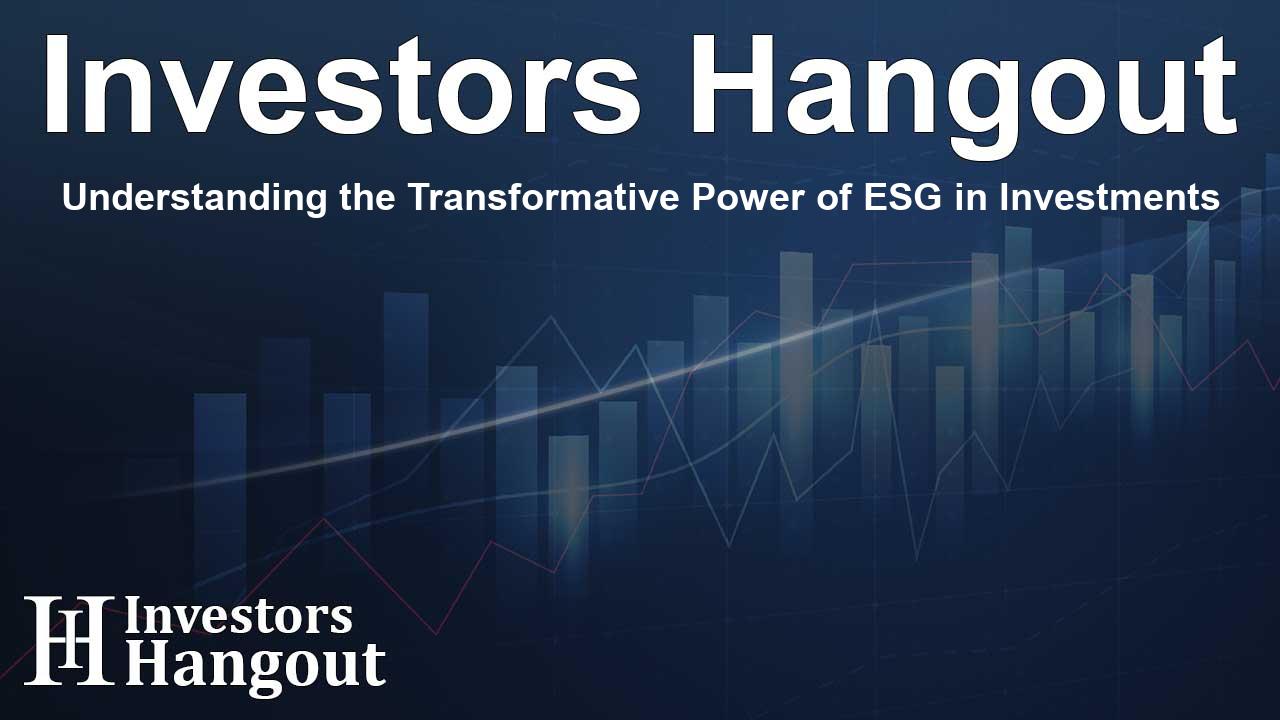Understanding the Transformative Power of ESG in Investments

Understanding the Transformative Power of ESG Investing
What began as a relatively niche concept has evolved into a significant force, reshaping the equity market landscape. Investors today are increasingly motivated to align their portfolios with the growing recognition of climate change, social inequality, and the essential need for robust corporate governance. This shift goes beyond merely seeking financial returns; it is fundamentally altering corporate behavior and driving long-term performance.
The Rise of ESG Investing
In a recent discussion, Dr. Raul, Vice President of Woxsen University, highlighted how ESG investing incorporates environmental, social, and governance factors into investment analysis. Environmental considerations focus on aspects like a company’s carbon footprint, resource efficiency, and how well it adapts to climate-related challenges.
Social factors encompass employee diversity, labor practices, and the impacts of business operations on local communities. Governance aspects address critical elements such as executive compensation, board diversity, and transparency in financial dealings.
The demand for sustainable investment avenues has surged in recent years. Surveys indicate that a significant number of US investors—73%—project that the sustainable investment market will see major growth in the near future. While challenges still exist in the political and regulatory spheres, the combined forces of client demand, regulatory trends, and advancements in data analytics continue to fuel this evolution.
Key Trends Shaping ESG Investing
Market Growth and Resilience
Despite political challenges, the global ESG market is anticipated to reach remarkable heights, potentially hitting $40 trillion by the end of the decade. In response to pressures, some companies are opting for a quiet approach, with the practice referred to as 'greenhushing,' where they make green pledges without drawing attention to them, all while integrating these elements into their business strategies.
Regulatory and Policy Shifts
Across the globe, we observe significant regulatory developments, particularly in Europe, where ESG regulations are becoming more stringent. In the US, the situation is complex, with a mix of regulatory pushbacks alongside a stronger emphasis on ESG compliance. Investors must navigate these shifting dynamics to stay informed and involved.
Engagement and Stewardship
A significant 80% of assets in the US market are now covered by stewardship policies, revealing a trend where investors are taking a more proactive role in advocating for responsible corporate practices. This shift in engagement aims to promote ESG alignment and mitigate potential risks associated with corporate behavior.
Innovation and Technology
The advent of artificial intelligence and enhanced data analytics is revolutionizing how ESG impacts are measured and reported. This technological advancement enables investors to make more informed decisions and uncover new investment opportunities in areas such as biodiversity enhancement, carbon capture solutions, and resilient supply chains.
ESG Investment Strategies
Investors are now presented with a growing array of strategies to incorporate ESG principles into their investment portfolios:
- ESG Integration: The most prevalent strategy, adopted by a majority of investors, involves integrating ESG factors into conventional financial analysis.
- Exclusionary Screening: A significant number of investors employ negative screening practices, with many focusing on excluding fossil fuel investments.
- Thematic and Impact Investing: This approach targets specific themes such as renewable energy, sustainable agriculture, and social equity, while impact investing emphasizes quantifiable positive outcomes.
Challenges and Opportunities
While ESG investing is gaining traction, notable challenges remain. Issues like greenwashing, inconsistent regulations, and data transparency still pose hurdles. Nevertheless, the industry is actively working to address these concerns, improving data quality, refining impact measurement, and effectively communicating the intrinsic value of sustainable investing.
The Future of ESG in US Equities
Looking ahead, ESG investing is poised to remain a central feature of the US equity markets. As investor expectations evolve alongside regulatory frameworks, elements of sustainability, social responsibility, and effective governance will become vital for maintaining a competitive advantage and achieving sustained long-term returns.
In conclusion, the rise of sustainable and ESG investing marks a fundamental shift in the allocation of capital. This movement is poised to have profound implications for corporate success, market dynamics, and overall societal well-being.
Frequently Asked Questions
What is ESG investing?
ESG investing involves integrating environmental, social, and governance considerations into investment decisions, aiming to promote sustainable practices in businesses.
Why is ESG important for investors?
ESG factors can significantly influence long-term performance and help mitigate risks associated with corporate neglect of sustainability and governance issues.
How do investors incorporate ESG into their portfolios?
Investors can adopt various strategies like ESG integration, exclusionary screening, and thematic or impact investing to align their portfolios with ESG principles.
What challenges does ESG investing face?
Major challenges include greenwashing, regulatory inconsistencies, and issues related to data transparency and quality.
What is the future outlook for ESG investing?
The trend towards ESG investing is expected to grow, becoming increasingly significant as investors and regulators place greater emphasis on sustainability and responsibility.
About The Author
Contact Olivia Taylor privately here. Or send an email with ATTN: Olivia Taylor as the subject to contact@investorshangout.com.
About Investors Hangout
Investors Hangout is a leading online stock forum for financial discussion and learning, offering a wide range of free tools and resources. It draws in traders of all levels, who exchange market knowledge, investigate trading tactics, and keep an eye on industry developments in real time. Featuring financial articles, stock message boards, quotes, charts, company profiles, and live news updates. Through cooperative learning and a wealth of informational resources, it helps users from novices creating their first portfolios to experts honing their techniques. Join Investors Hangout today: https://investorshangout.com/
The content of this article is based on factual, publicly available information and does not represent legal, financial, or investment advice. Investors Hangout does not offer financial advice, and the author is not a licensed financial advisor. Consult a qualified advisor before making any financial or investment decisions based on this article. This article should not be considered advice to purchase, sell, or hold any securities or other investments. If any of the material provided here is inaccurate, please contact us for corrections.
